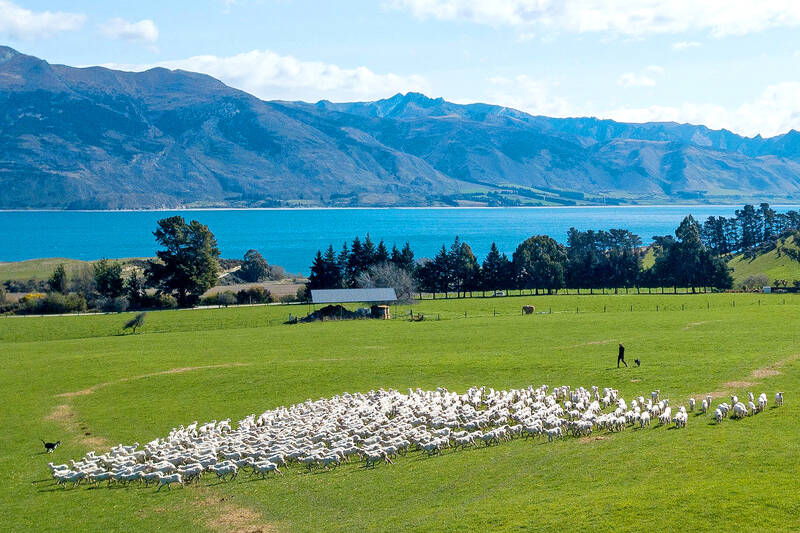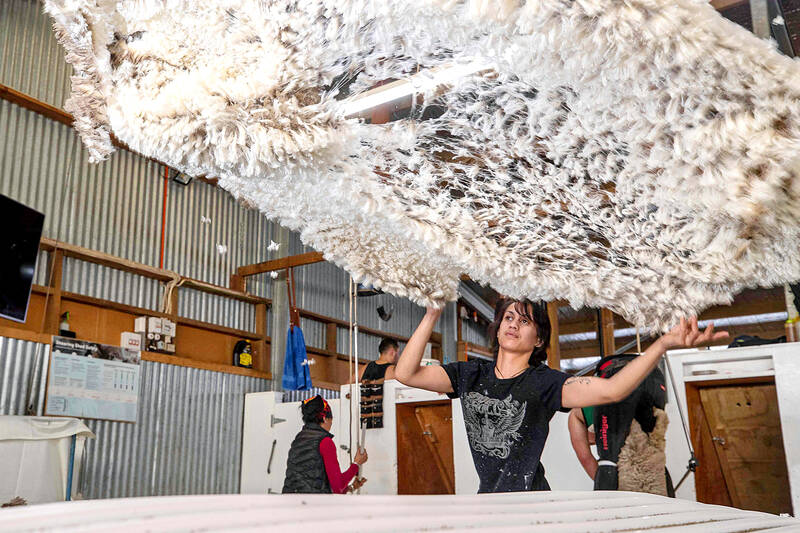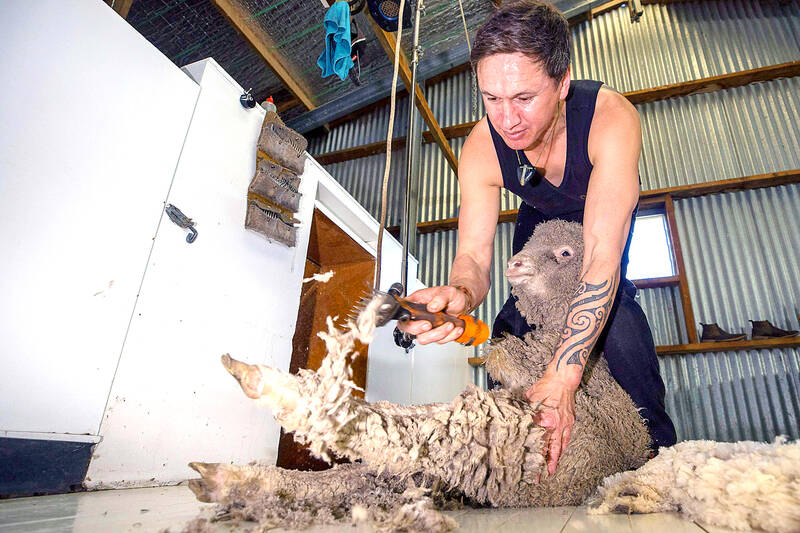Classical music, soft mattresses and the gentlest touch of a wool clipper: welcome to the New Zealand farm indulging what may be the world’s most pampered sheep.
Forget any preconceptions of rough-hewn shearers manhandling the flock as they quickly deprive them of their fleece in crowded, noisy wool-sheds.
At Lake Hawea Station on New Zealand’s South Island, owners Geoff and Justine Ross are advocates of the gentler, more soothing art of “slow-shearing.”

Photo: AFP
The sounds of Debussy, Vivaldi and Mozart may be wafting through the shed as shearers usher the ewes from their pens before trimming off their thick wool with slow, methodical strokes of the clippers.
Shearers are paid according to the sheep’s overall experience: stress, bruises and cuts can lead to lower wages. The trimming is performed on pristine whitewashed boards, to better reveal any nicks inflicted on the sheep’s skin. Once shorn, each sheep is guided towards a chute, where it slides into a holding pen — landing not on gravel but on a soft mattress.
It’s sheep shearing, reconsidered from the sheep’s perspective.

Photos: AFP
“It came first from a place of care for the animal,” Justine Ross said. “We’re all about having happier, calmer sheep. That starts with the way we treat them.
Ross said that they raised lambs in our first season.
“Once you see their personality and their unique character, you know the great responsibility of their care. And we have 10,000.”

Photo: AFP
SILENCE FOR THE LAMBS
On the station, there are “silent yards” where working dogs are trained not to bark while moving the merino flock.
In the hospital paddock, sick sheep get extra nutrition and medical treatment.
“You lose animals in farming, that’s a fact, but sometimes with a little extra love and care, they come good,” Ross said.
After reading that cows produce more milk if played classical music, Ross decided to make additions to the playlist in the shearing shed, where high-tempo rock, pop or rap is typically heard.
“We sometimes play Mozart. Some dairy farmers use it as a way to calm the animals,” Ross said. “Vivaldi’s Four Seasons is probably my favorite. We’re just trying stuff to build a case for less stress for the animal and a calmer, happier shed.”
New Zealand is home to five million people and 25 million sheep.
It is one of the world’s main wool exporters, sending 84 million tonnes, worth US$232 million, overseas in the last financial year.
Shearing, meanwhile, is hard, physical work.
It demands skill and stamina to handle the sheep. Each weighs up to 60 kilograms and can give the occasional painful kick. A good shearer trims several hundred sheep per day.
Traditionally, shearing was about speed, with little concern given to the occasional cut. Nowadays, animal welfare is a key factor, said Carolyn Clegg from New Zealand’s shearing association.
The priority remains trimming the best quality wool, she said, “but that extends to the sheep — you don’t want them cut up or under stress, because that affects their welfare.”
‘RELAXED AT ALL TIMES’
On the Lake Hawea station, farm manager Jack Mansfield said he likes to see “a nice slow, tidy job with the sheep relaxed at all times.” Pay is based on how the sheep are handled — known as stockmanship — and whether they are free of scratches, with the extra care coming at the cost of volume.
“We’re possibly down 50 sheep a day, which probably ends up being a couple of NZ$100 out of our back pockets,” said shearing gang leader Kevin Patrick O’Neill.
“That is replaced with a bonus from the farmer.”
The slower pace also means the sheep are less inclined to wriggle or kick.
“If we’re calm and relaxed, the sheep are too,” O’Neill added.
After selling their successful vodka business to an international spirits company, Geoff and Justine Ross bought the sheep station in 2017, determined to make it sustainable.
It was the first New Zealand farm to be certified as carbon clear by a government research institute.
In addition to keeping emissions down, the couple also wanted to reduce stress on their sheep.
And focusing on animal welfare has business benefits too, said Justine Ross.
“Our clients are demanding animal welfare credentials as part of their fiber purchasing. If an animal isn’t stressed — full of that fight-or-flight energy — then they will use that energy to grow more wool,” she said. UK-based merino knitwear firm Sheep Inc is one of the companies that buys their wool.
Co-founder Edzard van der Wyck said they were drawn to Lake Hawea because of its carbon-clear status and animal welfare policy.
“If you bring less stress into a sheep’s life, there is less breakages in the wool fiber, so the quality sustains itself,” he said.

On April 26, The Lancet published a letter from two doctors at Taichung-based China Medical University Hospital (CMUH) warning that “Taiwan’s Health Care System is on the Brink of Collapse.” The authors said that “Years of policy inaction and mismanagement of resources have led to the National Health Insurance system operating under unsustainable conditions.” The pushback was immediate. Errors in the paper were quickly identified and publicized, to discredit the authors (the hospital apologized). CNA reported that CMUH said the letter described Taiwan in 2021 as having 62 nurses per 10,000 people, when the correct number was 78 nurses per 10,000

As we live longer, our risk of cognitive impairment is increasing. How can we delay the onset of symptoms? Do we have to give up every indulgence or can small changes make a difference? We asked neurologists for tips on how to keep our brains healthy for life. TAKE CARE OF YOUR HEALTH “All of the sensible things that apply to bodily health apply to brain health,” says Suzanne O’Sullivan, a consultant in neurology at the National Hospital for Neurology and Neurosurgery in London, and the author of The Age of Diagnosis. “When you’re 20, you can get away with absolute

May 5 to May 11 What started out as friction between Taiwanese students at Taichung First High School and a Japanese head cook escalated dramatically over the first two weeks of May 1927. It began on April 30 when the cook’s wife knew that lotus starch used in that night’s dinner had rat feces in it, but failed to inform staff until the meal was already prepared. The students believed that her silence was intentional, and filed a complaint. The school’s Japanese administrators sided with the cook’s family, dismissing the students as troublemakers and clamping down on their freedoms — with

As Donald Trump’s executive order in March led to the shuttering of Voice of America (VOA) — the global broadcaster whose roots date back to the fight against Nazi propaganda — he quickly attracted support from figures not used to aligning themselves with any US administration. Trump had ordered the US Agency for Global Media, the federal agency that funds VOA and other groups promoting independent journalism overseas, to be “eliminated to the maximum extent consistent with applicable law.” The decision suddenly halted programming in 49 languages to more than 425 million people. In Moscow, Margarita Simonyan, the hardline editor-in-chief of the